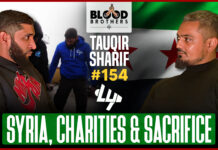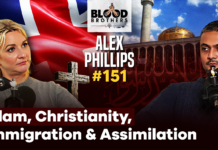Terrorism charges and the label “terrorist” itself seems to be exclusively reserved for Muslims, writes Dilly Hussain.
‘Terrorism’ is defined by the British government and the MI5 as: “The use or threat of action designed to influence the government or an international governmental organisation or to intimidate the public, or a section of the public; made for the purposes of advancing a political, religious, racial or ideological cause”. Unlike terms such as ‘extremism’ and ‘British values’, terrorism appears to have a patent meaning. Taking this into consideration, it’s very unfortunate how the disproportionate labelling of ‘terrorist’ is frequently applied to Muslims in comparison to non-Muslims.
In many cases, Muslims have been prosecuted for much less than the “use or threat of action” for the purpose of fulfilling ideological causes. There are numerous examples where Muslims have been incarcerated for merely voicing their political views; whether it was supporting the legitimacy of Afghani, Iraqi or Palestinian resistance to the invasion of their lands, the possession or downloading of ‘terrorist’ material, and more recently, supporting the Syrian rebels in their fight against Bashar Al Assad.

After a humiliating 13-year war of attrition in Afghanistan, the defeated Nato-led coalition had no other option but to accept that the Taliban were a major political player, and dialogue with them to reach a political solution could have saved many lives.
Similarly, the UK government had no choice but to sit down with the IRA after 80 years of war.
The Brighton Hotel bombing in 1984, which was a direct attempt to eliminate the Tory leadership, namely Prime Minister Margaret Thatcher, the rockets fired at the MI6 building and the Downing Street mortar attack by the IRA, is just another example of when ‘terrorists’ were eventually acknowledged as the lawful opposition.
The Curious Tale of Ryan McGee
Subscribe to our newsletter and stay updated on the latest news and updates from around the Muslim world!
In 2007 former British National Party (BNP) candidate Robert Cottage, was accused of planning to kill Prime Minister Tony Blair, and preparing for a race war in Britain. In spite of his extremist views towards foreigners and immigrants, he was never charged with terrorism. Cottage was found in possession of the largest stockpile of chemical explosives in the history of the UK, and pleaded guilty under the Explosives Substances Act of 1883.

Last Friday, British soldier and supporter of the English Defence League (EDL) Ryan McGee, was jailed for two years after it was revealed that he had made nail bombs filled with 181 pieces of shrapnel to maximize damage. The 20-year-old from Eccles, Greater Manchester, wrote in a journal: “I vow to drag every last immigrant into the fires of hell with me.” Police discovered how McGee downloaded a video of two men beneath a swastika flag, one being beheaded and the other killed by a gunshot to the head, and then encouraged people online to do the same if they hated immigrants. The court heard that McGee came from a family with far-right views, and had attended an EDL rally whilst holding a “No Surrender” EDL flag and donning an EDL T-shirt and jumper – all bought by his mother for his 18th birthday. Like Robert Cottage, McGee pleaded guilty under the outdated Explosives Substances Act.
McGee fulfilled every physical and ideological condition to qualify as a terrorist, yet the prosecutor stated that he was not a terrorist but an “immature teenager” who had no intended targets. Maybe it was because the single defining attribute that McGee didn’t possess to be deemed as a ‘terrorist’ by the courts, was that he wasn’t a Muslim. Not a single article in the British press mentioned the word ‘terrorist’ in reference to McGee’s case. The hypocrisy and double standards of the British justice system and the media is as clear as daylight. Unlike Robert Cottage, who attempted to assassinate a British Prime Minister, and the IRA who bombed state institutional buildings, Muslims who have never attempted, let alone executed such acts, are regularly branded as ‘terrorists’ and prosecuted under the Terrorism Act of 2000.
Double Standards
Compare the case of Cottage and McGee to that of Yusuf Sarwar and Mohammed Nahin Ahmed, the two 22-year-olds from Birmingham that were handed 13 years each for attending a Syrian rebel training camp.
Sarwar’s mother, who informed the police of her son’s whereabouts after she found a letter written by Yusuf stating that he went to Syria to fight the Assad regime, felt “betrayed” when such a harsh sentence was given to her son.

Sentencing Ahmed and Sarwar, Judge Michael Topolski described the two men as “deeply committed to violent extremism.” However, the “violent extremism” that Judge Topolski was referring to, would never have materialised into physical acts of terrorism on British soil by either men, but this most certainly was not the case with Cottage or McGee.
The ongoing hysteria over “Syria-related” terrorism is a fine example of the shambolic misapplication and biased treatment of Muslims in Britain’s ‘two-tier’ justice system.
Over the past few months, there have been many high-profile cases that have led to custodial sentences being dished out to British Muslims who travelled to Syria to fight with the Syrian rebels. The main motivation of these men was to help the oppressed Syrians against a brutal dictator, which the UK is now covertly allied with against ISIS.
In most, if not all of these cases, judges have concluded that returning jihadists “posed no threat to the UK” but had either commissioned, instigated or prepared acts of terrorism abroad.
During a time where Muslim activists and aid workers are being arrested, mothers are being told to spy on their ‘jihadi’ sons, passports are being confiscated and citizenships are being revoked rendering people ‘stateless’, it raises some serious questions for Muslims living in Britain.
How can they trust the establishment which continues to implement draconian anti-terror laws that exclusively target Muslims, and consequently alienates an entire religious minority as a suspect community?
This article was first published on the Huffington Post.
@DillyHussain88






















